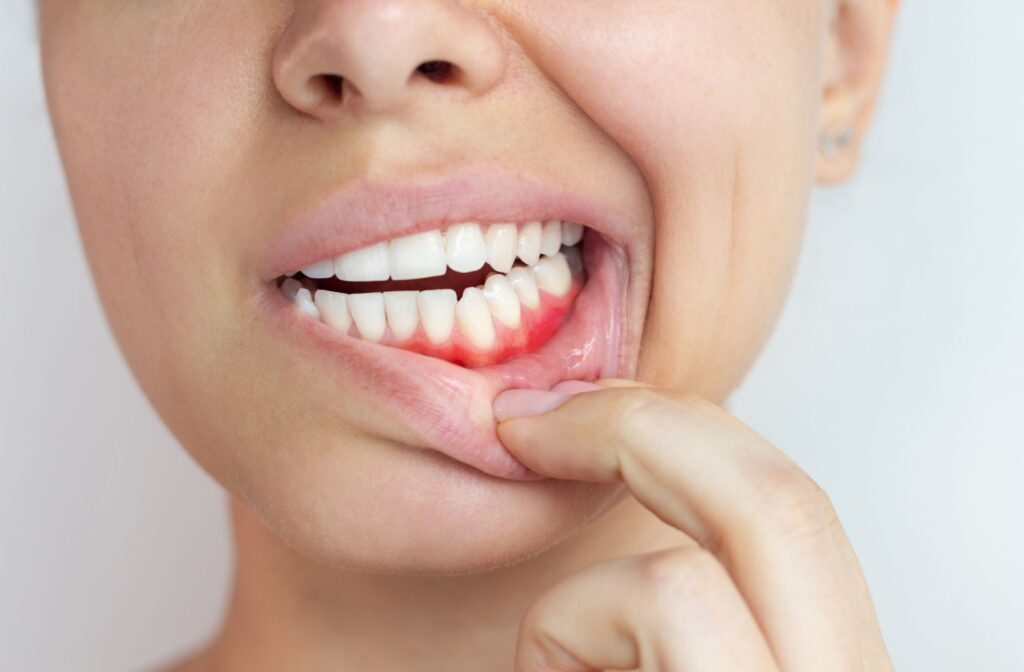Bleeding gums, persistent bad breath, and gum sensitivity are some of the earliest warning signs of gum disease and should not be ignored. Left untreated, gum disease can progress from mild irritation to more serious issues like receding gums, tooth loss, and infection.
Gum disease often begins silently and without obvious symptoms, but early detection is possible with proper awareness. Recognizing these early symptoms and knowing how gum disease develops can help you take proactive steps to protect your oral health.
What Is Gum Disease?
Gum disease, also known as periodontal disease, is an infection of the tissues that support your teeth. It begins when plaque—a sticky film of bacteria—builds up on your teeth due to inadequate cleaning. Over time, this plaque hardens into tartar, which irritates the gum line and creates the perfect environment for bacterial growth.
The progression typically follows this pattern:
- Gingivitis: The earliest stage, characterized by gum inflammation
- Periodontitis: Advanced gum disease that can damage the tissues and bone supporting your teeth
According to the Canadian Dental Association, gum disease is incredibly common, but it’s also highly preventable when caught early and managed properly.
Early Warning Signs of Gum Disease
The trick to maintaining healthy gums is recognizing problems before they escalate. Early-stage gum disease often develops quietly, but certain signs can alert you to potential issues.
- Bleeding gums: Healthy gums should not bleed during regular brushing or flossing. If you notice blood on your toothbrush or dental floss, this is often the first sign of gum inflammation.
- Red or swollen gums: Gums that appear red, puffy, or feel tender to the touch indicate inflammation. Healthy gums should be firm and pale pink.
- Persistent bad breath: Bacteria trapped beneath the gum line produce toxins that cause lingering bad breath or an unpleasant taste in your mouth.
- Gum sensitivity: Discomfort or sensitivity in your gums while eating, drinking, or brushing can indicate early gum problems.
Symptoms That Require Fast Attention
When gum disease progresses beyond the early stages, it can cause more serious symptoms that require professional treatment.
- Receding gums: Advanced gum disease causes gums to pull away from your teeth, exposing more of the tooth surface or root.
- Loose or shifting teeth: Severe gum disease weakens the tissues and bone that anchor your teeth in place. You may notice teeth feeling loose or shifting position, which can affect your bite and overall oral function.
- Discomfort chewing: Discomfort while chewing suggests the infection has progressed to affect the supporting structures of your teeth, including the gums and potentially the underlying bone.
- Pus around the gums: The presence of pus around your gum line indicates an active infection that requires immediate dental attention.
Risk Factors for Gum Disease
Understanding your risk factors can help you take proactive steps to prevent gum disease:
- Poor oral hygiene: Inadequate brushing and flossing allow plaque to accumulate and harden into tartar.
- Smoking and tobacco use: These habits significantly increase your risk of gum disease and interfere with your body’s ability to heal.
- Genetics: Some people are genetically predisposed to gum disease, making prevention even more important.
- Medical conditions: Diabetes, autoimmune disorders, and certain medications can increase your susceptibility to gum problems.
- Hormonal changes: Pregnancy, menopause, and other hormonal fluctuations can make gums more sensitive to bacteria.
- Poor nutrition: A diet lacking in essential nutrients, particularly vitamin C, can weaken your immune system’s ability to fight gum infection.

How to Prevent Gum Disease
Prevention is always preferred over treatment. These daily habits can help reduce your risk of developing gum disease:
- Brush and floss consistently: Brush your teeth twice daily with fluoride toothpaste using proper technique. Floss daily to remove plaque and food particles from between your teeth and below the gum line where your toothbrush can’t reach.
- Use an antibacterial mouthwash: Incorporate an antibacterial mouthwash into your routine to help reduce plaque-causing bacteria and control gum inflammation.
- Stay hydrated: Drinking plenty of water throughout the day helps wash away food particles, sugars, and bacteria that can contribute to plaque formation.
- Maintain a nutritious diet: Focus on eating foods rich in vitamins and minerals that support gum health. Include plenty of fruits and vegetables, especially those high in vitamin C, which helps strengthen gum tissues.
- Avoid smoking: Quitting smoking is one of the most impactful changes you can make for your gum health. Smoking reduces blood flow to the gums, impairs healing, and increases your risk of developing severe gum disease.
- Schedule regular dental visits: Professional cleanings and examinations every 6 months allow your dental team to remove tartar buildup and detect early signs of gum disease before they become serious problems.
Professional Treatment Options for Gum Disease
When gum disease has already developed, several treatment options can help restore your oral health:
- Professional dental cleanings: Regular professional cleanings remove plaque and tartar that regular brushing and flossing can’t remove.
- Scaling and root planing: This deep cleaning procedure removes bacteria and tartar from below the gum line and smooths the root surfaces to help gums reattach to teeth.
- Antibiotic therapy: Your dentist may prescribe antibiotics in the form of mouth rinses, gels, or oral medications to help control bacterial infection and reduce inflammation.
- Surgical treatments: Advanced cases may require surgical intervention, such as gum grafts to replace lost tissue or flap surgery to reduce pocket depth and facilitate better cleaning.
Take Action Today
Healthy gums are important for a strong, lasting smile. Catching early signs of gum disease and following good prevention habits can help you avoid more serious oral health issues. Don’t wait for symptoms to worsen; early care can make a big difference.
For personalized care and professional treatment options, contact Arch Dental. Our team is here to support your gum health and keep your smile healthy.


